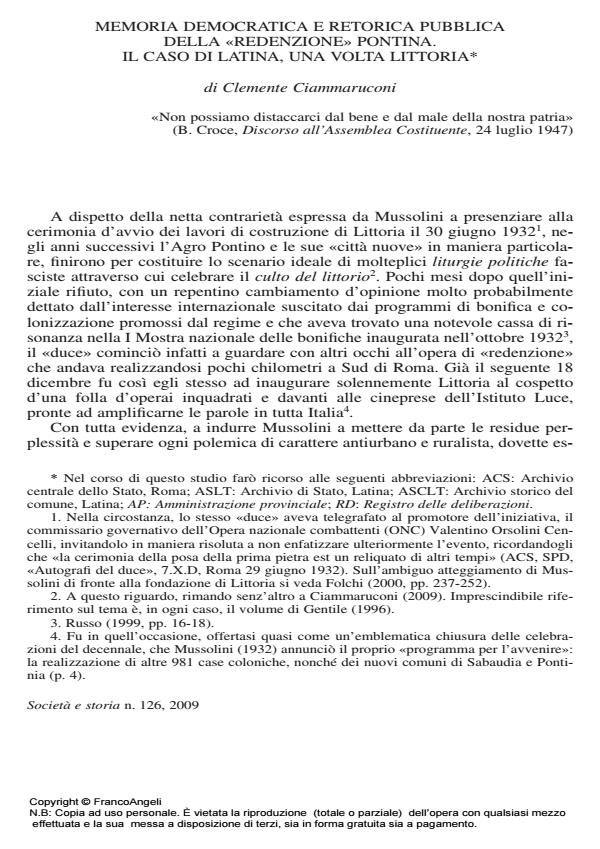Memoria democratica e retorica pubblica della "redenzione" pontina. Il caso di Latina, una volta Littoria
Titolo Rivista SOCIETÀ E STORIA
Autori/Curatori Clemente Ciammaruconi
Anno di pubblicazione 2010 Fascicolo 2009/126
Lingua Italiano Numero pagine 35 P. 634-668 Dimensione file 744 KB
DOI 10.3280/SS2009-126003
Il DOI è il codice a barre della proprietà intellettuale: per saperne di più
clicca qui
Qui sotto puoi vedere in anteprima la prima pagina di questo articolo.
Se questo articolo ti interessa, lo puoi acquistare (e scaricare in formato pdf) seguendo le facili indicazioni per acquistare il download credit. Acquista Download Credits per scaricare questo Articolo in formato PDF

FrancoAngeli è membro della Publishers International Linking Association, Inc (PILA)associazione indipendente e non profit per facilitare (attraverso i servizi tecnologici implementati da CrossRef.org) l’accesso degli studiosi ai contenuti digitali nelle pubblicazioni professionali e scientifiche
Fin dalla loro fondazione, le «città nuove» sorte nell’Agro Pontino bonificato dal regime fascista negli anni trenta costituirono lo scenario ideale di molteplici liturgie politiche attraverso cui celebrare il «culto del littorio». L’autore si propone d’indicare secondo quali processi, nel corso del secondo dopoguerra, a Latina (già Littoria) si sia cercato di costruire una memoria condivisa ed un senso di appartenenza comunitaria capaci di ricomporre in chiave democratica l’eredità di quella «impresa» indelebilmente connessa al fascismo, nonché alla figura stessa di Mussolini. In tale prospettiva cerimonie, monumenti, anniversari, hanno rappresentato i cardini dell’opera di rielaborazione di un passato ancora recente che amministrazioni, prima democristiane e poi di destra, hanno condotto spesso non senza ambiguità: lo studio ne ricostruisce le diverse fasi, sia esaminando i nessi e le reciproche influenze tra memoria e retorica pubblica, sia indagando i criteri informatori che hanno orientato questa faticosa e tutt’altro che compiuta ricerca identitaria.
Parole chiave:Agro Pontino, città di fondazione, Latina/Littoria, retorica pubblica, memoria identitaria
Clemente Ciammaruconi, Memoria democratica e retorica pubblica della "redenzione" pontina. Il caso di Latina, una volta Littoria in "SOCIETÀ E STORIA " 126/2009, pp 634-668, DOI: 10.3280/SS2009-126003